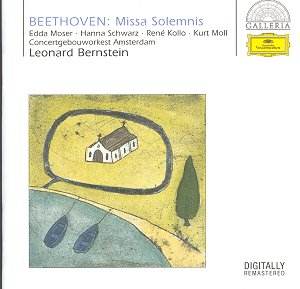Ludwig van BEETHOVEN (1770-1827)
Missa solemnis in D, Op. 123.
 Edda Moser (soprano); Hanna
Schwarz (contralto); René Kollo (tenor); Kurt Moll (bass); Radio Chorus
of the N. O. S., Hilversum; Concertgebouw Orchestra/Leonard Bernstein.
Edda Moser (soprano); Hanna
Schwarz (contralto); René Kollo (tenor); Kurt Moll (bass); Radio Chorus
of the N. O. S., Hilversum; Concertgebouw Orchestra/Leonard Bernstein.
 DG Galleria 469 546-2
[ADD] [81.00]
DG Galleria 469 546-2
[ADD] [81.00]
Crotchet
£7.99
Amazon
UK £6.99 Amazon US

Bernstein's compulsive but idiosyncratic Missa solemnis fits (just)
onto one full-length CD, a triumph of convenience if ever there was one.
Edited together from two live performances in the Concertgebouw in 1979,
this is a major achievement that consistently puts the listener in awe of
the magnitude of Beethoven's magnificent creation.
The opening Kyrie is marked 'Assai sostenuto', and 'sostenuto' is
certainly one word to describe it: monumental is another. At this speed,
one feels for the stratospheric sopranos at their exposed entries (they cope
as well as can be humanly expected), but the impression is that this is but
one step on a long journey. Admission of mortal frailty at this stage is
not necessarily a bad thing.
The contrast with the ensuing Gloria is as violent as possible.
Bernstein's tempo is fast and furious (a live performance I heard conducted
by Giulini went to the opposite extreme, leading to a cataclysmic 'Deus Pater
omnipotens': and, incidentally, no necessary slamming on of the brakes at
the following 'Domine Fili unigenite'). However, Bernstein is never merely
impulsive. The Gloria (about 18 minutes long) emerges as spiritually
exhausting: the insistent, huge fugue on 'In Gloria Dei Patris' is given
absolutely full weight. With Bernstein, the final choral cry of 'Gloria',
thrown out almost as a challenge from Mankind, is too near to overwhelming
for comfort.
The intensity of the Credo might seem to some almost too much after
that: this is at no point a performance for the faint-hearted. The statements
of 'I believe in one God' ('Credo in unum Deum') are so powerful they seem
to dare the Almighty himself to contradict them, and I doubt whether any
God would, omnipotent or not. Hardly surprisingly for Bernstein, the contrast
at 'Et incarnatus est' is complete: peace reigns, shrouded in peace and holy
mystery. Just as Beethoven's faith was all-encompassing, so Bernstein dares
to reflect this in his performance.
Herman Krebbers' violin solo in the 'Benedictus' section of the
Sanctus begs for mention. He is pure of tone and beautifully ethereal.
The vocal soloists are vibrant (in all senses, especially the contralto,
Hanna Schwarz) but this is not entirely inappropriate to the scale of Bernstein's
conception. The bass Kurt Moll is particularly emotive in the Agnus Dei.
Despite some rampant idiosyncrasies, Bernstein never descends into sludge
or sentimentality. His Hilversum chorus clearly give their all (such was
the personality of the man I doubt anything less was possible). The sum of
the constituent parts is an extraordinary achievement. The meeting of three
big personalities (Beethoven, Bernstein and, if you care to believe in him,
God) here leads to a classic performance, a million galaxies away from any
authenticist response (for which, go to John Eliot Gardiner with the Monteverdi
Choir and the English Baroque Soloists on Archiv 429 779-2). The Missa
solemnis, more than most texts, will continue to generate a multiplicity
of fertile approaches. You should experience this one, without a shadow of
doubt.
Reviewer
Colin Clarke

